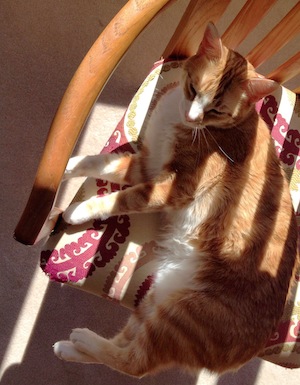I’ve asked about what it means to be “too commercial” before, but this article in Hyperallergic had me thinking about it again.
 It discusses a limited-edition $2,500 book by Annie Leibovitz for Taschen and the Wu-Tang Clan’s plan to sell access to a pricey album for 1-time-only listening.
It discusses a limited-edition $2,500 book by Annie Leibovitz for Taschen and the Wu-Tang Clan’s plan to sell access to a pricey album for 1-time-only listening.
Deep Thought
While the Taschen book at Wu-Tang album are multiples, they’re still gimmicks (something I almost always embrace as a viable marketing ploy).
They are taking something that could easily be widely available for less money and making it more precious.
I don’t really have a Deep Thought question to go along with this. I just believe it’s worth thinking about whenever you worry about being too commercial in your own art career.
And, yes, using the photo here of my cat, Jack, however precious, is a gimmick.



15 thoughts on “When You’re Worried About Being Too Commercial in Your Art Career”
Oscar Wilde once said, “All art is quite useless.” What he meant by that, was deeply rooted in the need for art to not serve a purpose attached to a price or value, thereby having it enter a different realm of existence.
Just something else to make one think… https://www.youtube.com/watch?v=C3atdpeEpB4
Of course “too commercial” exists. How much is “enough?” 😉
I love “a different realm of existence,” Janice.
I think “Too Commercial” happens only when you’ve crossed the line into caring only about money and not quality. Personally, I like a good gimmick, as long as it offers me some form of joy. For instance, the cat picture. He’s cute. What’s not to love?
Agreed, Mani.
Agreed on all counts except that I would assume “joy” also is something we would hope for our clients – via our “gimmick”. As for the cat. . . Yeh. . . Cute. . . Mine’s cuter. . . And anyway, cats, dogs, budgies – none make me want to buy anything.
I do worry about my main work being too commercial but it gives people pleasure, so why not? I do other work that isn’t commercial at all so I guess it evens out. There ARE some artists who I frankly despise because their work is just so commercial and so obviously about making money, and there are others who spoof the whole commercial aspect of it.
as for gimmicks, I have my two cats as my shop assistants and I know people find that fun.
lin: I hope you don’t really despise other artists who have different goals than you.
Completely agree, lin. Professionalism is about integrity and balance. If you go over the mark it taints everybody. THis is not about “different goals”.
I’m looking for the Like button…Oh right we’re not on facebook…sorry, carry on…
In addition to art, I write novels (none yet published). All contain humor, which frequently is based on gimmicks. So, why should art be exempt?
As far as too commercial, that’s up to the buyers.
Love your cat,
Kathy
I’m with you, Kathy.
The gimmick in this case is actually a market test. Are there people who will fork over a couple thousand bucks for a single listening of a well known artist’s book? What happens if the listener is interrupted? Obviously this particular gimmick won’t work for everyone ( artist and listener), but it’s an interesting experiment.
Clearly it is aimed at a specific market which the experimenter believes not only has the disposible income but the economic confidence to spend on something very ephemeral.
This gimmick is about being famous (?)enough to get away with this outlandish display of disrespect for clients – especially those who are enamoured with the person’s work. Again, balance and integrity. Or maybe I’m just too old to know anything about today’s “freer” marketplace. . .
A market test????? More in line with Dr. John Bridge Church of England, 1587 quote:
If they pay a penie or two pence more for the reddinesse of them..let them looke to that, a foole and his money is soone parted.
And in French : Plus ça change, plus c’est pareil. . .
Until recently, in the last few hundred years, most people lacked the time or money either to buy or to create art. Art available for public appreciation or purchase was nearly always due to the commercial success in other areas of both a benefactor and a buyer or a commissioner, all of whom often lacked any skills in creating art. And it was these commercial achievers who made that third soul’s–the artist’s–creations possible.
Without the Medici’s, there would have been no Michelangelo, nor a Leonardo without a Sforza or a Verrochio, himself a beneficiary of successful businessmen.
I think it’s natural to hold art for art’s sake as the ideal, but commercialism has ever given it legs to stand on.